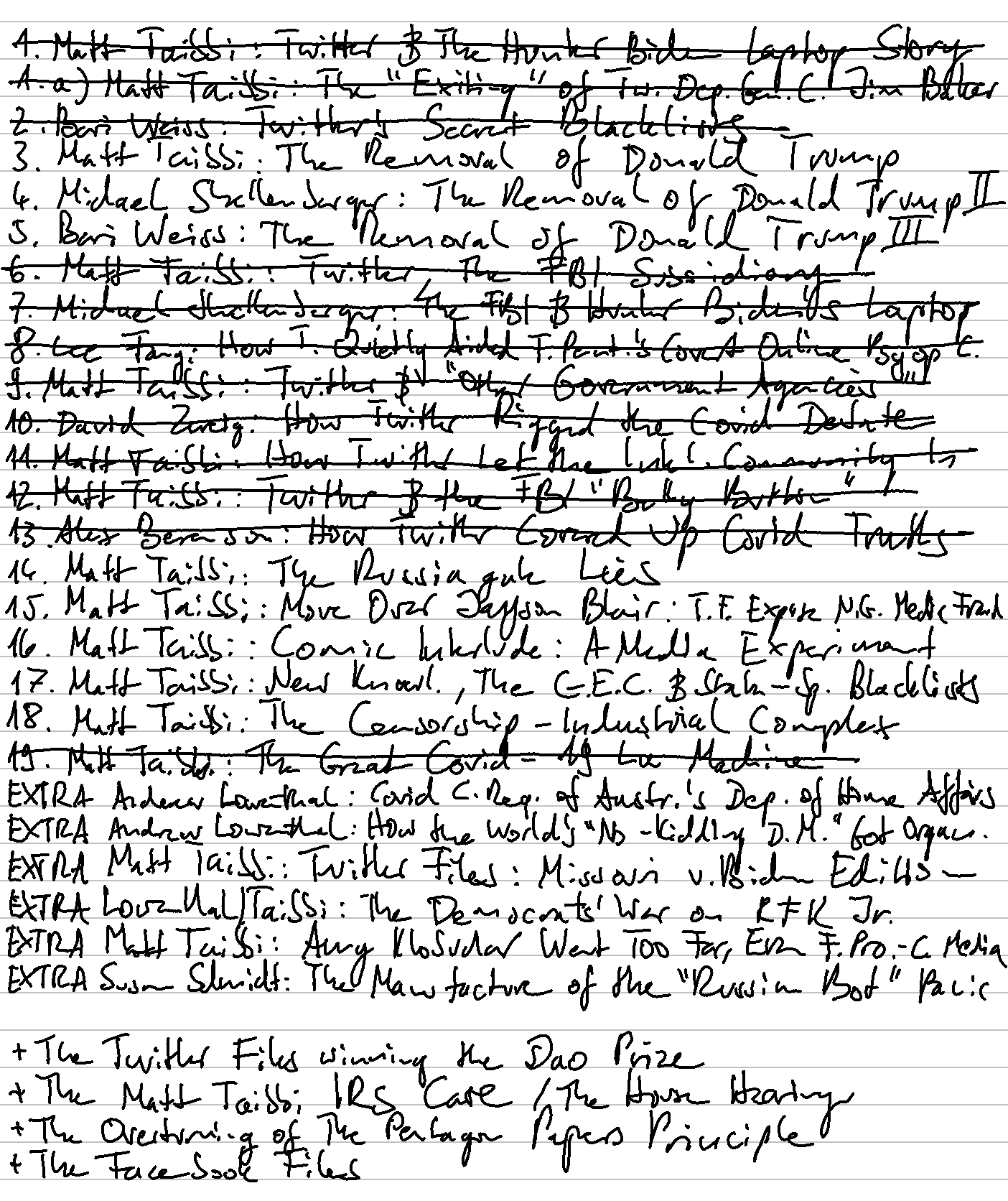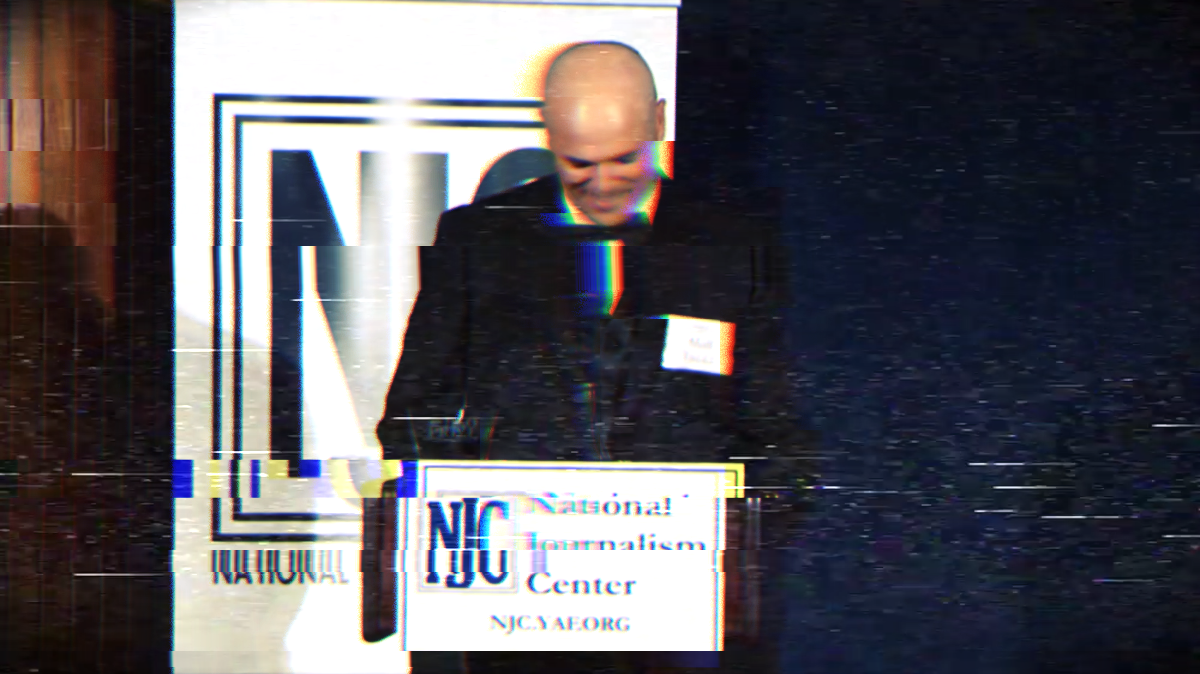The reporters from the Twitter Files project just won the Dao Prize for excellence in investigative journalism. Could there be a better time to dive back into these stories?
After a pause of several months when it comes to this topic, I’m returning to The Twitter Files, to finish my reporting on it. There were several important reports in this series of revelations that I haven’t covered yet, and I would like to do so in coming episodes.
Some Comments on Religion
I got some replies to my comments on religion from the previous episode. Fadi and Evgeny both argue that religion doesn’t always have to be organised.
Fadi:
I think the issue is that we use one word “religion” to refer to two distinct things, and from my point of view, making this distinction, makes it easier to take a position.
On one side, you have “organized religions” where you have a creed, that is being propagated and dictated by a central authority. On the other, you have the “personal belief”, which stems from ones recognition of our own limitations.
Evgeny:
I identify myself as a Discordian. In Discordianism, it is explicitly understood that every human has a way of directly communicating with the God, and nobody’s communication is clearer or more “true” than anyone else’s.
This seems to guard Discordianism (or any religion with similar clauses) from becoming an organized religion even if it gains a lot of followers: by definition, no one can tell you what God wants you to do, because they can’t know it better than you yourself can. So no, not every religion necessitates organisation.
Meanwhile, Yannis said in an email:
I found myself agreeing with the perspective of the historian Tom Holland. This is a macro-view so it will take some time to explain.
He was discussing The Iliad and historical Troy. As we now know Troy almost certainly existed, we realise that Ancient Greeks probably knew Troy existed too. However, it was as distant to them as the Middle Ages for us, so they had a pop culture-driven idea of it. This is not the main point but an important part to remember.
He then moved into discussing the film Troy and how that takes out almost all the supernatural elements. He contrasts that with the film 300, about a historical event. I think 300 is a terrible film, but it is truer to the ancient Greco-Roman mindset: that the weak are contemptible and strength is honourable in itself.
Christianity introduced the idea of suffering being righteous and having a redeeming quality. It likes strength but it likes suffering even more. It is almost impossible to escape this trope in secular pop media today.
To Holland’s understanding of European history, there was almost no change in this popular idea until the Nazis. Not even Communism changed this fundamental idea. But Nazism was an upending of the existing order, because it was so callous about life’s worth, racial supremacy and a “might makes right”, Darwinist attitude where it was never meant to be applied. At least Crusaders were condemned for targeting Christians in their own time (see e.g. the Fourth Crusade), though many medieval Christians saw heathens as “fair game”.
On that basis, it’s hard to say that the Nazi appetite for killing was an evolution of existing mores. It was a genuine revolution in thinking. A very bad one. This cannot be said for Communism, which is why they had to be so ideological every time they excluded someone. In this, Communists were just like Christians who went to war over tiny differences like like the nature of Jesus (Miaphysites, Arians…).
I do wonder if we’ll finally shed this idea with the decline of religion in the Western World and East Asia. I think it isn’t long until the rest of the world follows. However, we should be wary of whatever replaces it, as at least (speaking as an atheist) the Christian version is more compassionate than what came before and after.
As for this current conflict, I think it is a new phase in it. It has now definitively moved into a holy war from a nationalist war. Palestinian nationalism has been fully subsumed by jihadism. The Israeli government too has been taken over by people who put their faith first. It’s worth remembering the first Prime Minister of the country was an atheist as were many of its founders.
I get that you don’t understand but it is worth remembering that you are also very cosmopolitan in background and mindset, having freely moved and travelled to other countries. It is just a different mindset in the Middle East where family and affiliation is extremely important. In the West it’s been held up as a great thing to be different and break away from your parents, starting with the Baby Boomer generation. I’m honestly not sure if this is a healthy attitude for society, but at least there has been almost no conflict between this states since this individualist mindset got embedded.
I thought this perspective would be interesting and would be curious in your thoughts in response.
Where My Twitter Files Reporting Stands
Here’s my to-do list of all Twitter Files reporting with the reports I have covered on this show crossed out:

My reporting of The Twitter Files started last December and encompasses the following episodes of the podcast:
- Episode 135: The Twitter Files, Part 1
- Episode 136: The Twitter Files, Part 2
- Episode 140: The Twitter Files, Part 3
- Episode 150: The Twitter Files, Part 4
- Episode 151: Musk Kills the Twitter Files
- Episode 155: The Twitter Files, Part 5
If you haven’t heard any of these episodes yet, it might be worth going back and revisiting them. The first episode explains what The Twitter Files are and how their reporting came about – a unique and fascinating story.
What’s Left to Cover
As far as I see it, this leaves the following topic areas for me to cover:
The Removal of Donald Trump from Twitter
- October 2020 - 6 January 2021, Matt Taibbi
- 7 January 2021, Michael Shellenberger
- 8 January 2021, Bari Weiss
- The Russiagate Lies, Matt Taibbi
- More Adam Schiff Ban Requests, Matt Taibbi
Hamilton 68 & Other Media Follies
- Move Over, Jayson Blair: Twitter Files Expose Next Great Media Fraud, Matt Taibbi
- Comic Interlude: A Media Experiment, Matt Taibbi
The Censorship Industrial Complex
- New Knowledge, the Global Engagement Center, and State-Sponsored Blacklists, Matt Taibbi
- Statement to Congress: The Censorship-Industrial Complex, Matt Taibbi
- Matt Taibbi on his House Subcommittee testimony
- Matt Taibbi on his IRS Case, recent update
Twitter Files “Extras” Reporting
- The Covid Censorship Requests of Australia’s Department of Home Affairs, Andrew Lowenthal
- How the World’s “No-Kidding Decision Makers” Got Organized, Andrew Lowenthal
- Twitter Files: Missouri v. Biden Edition, Matt Taibbi
- The Democrats' War on RFK, Jr Andrew Lowenthal and Matt Taibbi
- Amy Klobuchar Went Too Far, Even For Pro-Censorship Media
- The Manufacture of the “Russian Bot” Panic, Susan Schmidt & New Twitter Files Story Raises Question: Is It Hoaxes All the Way Down?, Matt Taibbi
Related Stories That Should Also Be Discussed
These two stories are tangentially related to the Twitter Files and also worth discussing, I think:
- The New “Facebook Files” Show Everything the First Amendment Was Designed to Prevent & The Most Embarrassing “Facebook Files” Revelation? The Press, Exposed as Censors, Matt Taibbi
- Who Helped Overturn the “Pentagon Papers Principle”? The Washington Post and New York Times (plus addendum), Matt Taibbi
The Twitter Files Win the Dao Prize
The Twitter Files reporting has won the newly instituted Dao Prize for excellence in investigative journalism.
Credits
First and foremost, I would like to thank everybody who provided feedback on this or previous episodes. You are very important to the continued success of this podcast!
This podcast is provided free of charge and free of obligations under the value-for-value model. However, as a freelance journalist volunteering my time to produce this show, I need your support. If you like my work and want to make sure The Private Citizen keeps going, please consider joining my Patreon.
Showrunners
- Sir Galteran
Executive Producers
- Butterbeans
- Jaroslav Lichtblau
- Rizele
- Sandman616
Supervising Producers
avis, Bennett Piater, Dave, ikn, Jackie Plage, Jonathan M. Hethey, krunkle, Michael Mullan-Jensen, Tobias Weber
Producers
Andrew Davidson, astralc, Barry Williams, Cam, Captain Egghead, Dirk Dede, Fadi Mansour, Florian Pigorsch, Joe Poser, MrAmish, RJ Tracey, Robert Forster
Associate Producers
D, Jonathan, Juhan Sonin, Kai Siers, RikyM, Steve Hoos, Vlad
Thanks to Bytemark, who are providing the hosting and bandwidth for this episode’s audio file.
The show’s theme song is Acoustic Routes by Raúl Cabezalí, licensed via Jamendo Music. This episode’s ending song is Tomahawk by Tigerblood Jewel, licensed via Epidemic Sound.
Podcast cover art photo by GegenWind.
